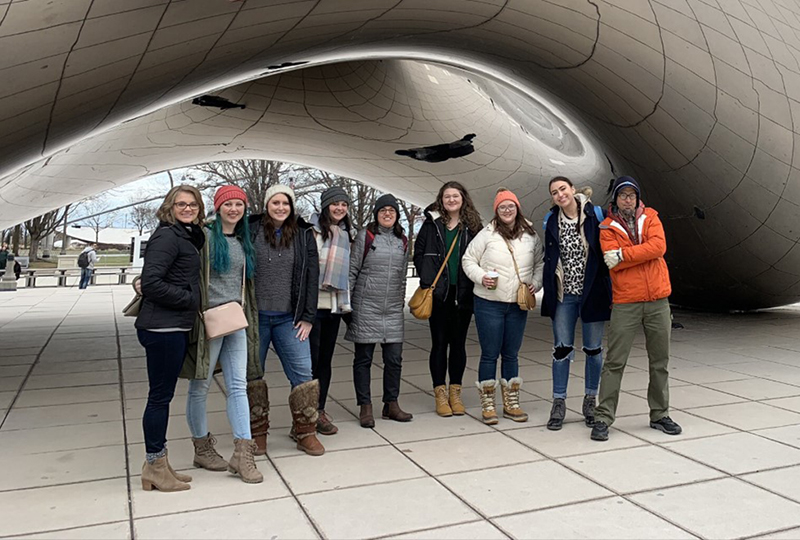
The educational partnership between the Arkansas Tech University interdisciplinary project based learning initiative and Denali Water Solutions has yielded an environmentally sustainable solution for the company’s home office in Russellville.
Students enrolled in an ATU spring 2020 course taught by Dr. Julie Mikles-Schluterman, professor of sociology, were charged with developing a composting program for Denali Water Solutions administrative office employees. ATU faculty members Dr. Randy Kelly (mechanical engineering), Dr. Masu Kuroki (business) and Dr. Justin Moss (psychology) served as special consultants.
“Denali has a branch of the company called WeCare that makes and sells compost,” said Chuck Campbell, special projects manager for Denali. “The philosophy behind composting is thrift. Being thrifty — making the most of our resources and avoiding wastefulness — is how Denali Water Solutions makes a living. It is both a business model and a philosophy. We choose this work because it is good work.”
ATU students created a composting handbook tailored to Denali’s Russellville office needs and developed plans for a compost kickoff day. Denali employees were to participate in training activities and games designed to make the implementation of the program efficient and fun.
Then came the onset of the coronavirus (COVID-19) pandemic.
Lauren Gallup, a senior environmental science major from Russellville, and her ATU classmates were required to shift gears.
“We decided to make a PowerPoint presentation with a voice over that could be sent to all employees that explained what we created and the program in general,” said Gallup. “We found online games that could be shared with them to practice what they can and can’t compost. Some of us plan on going into Denali once it is safe to do so and see this project through. We put a lot work into the project and really want to make sure Denali is successful in this endeavor.”
Project team member and senior ATU emergency management major Morgan Richardson of Clarksville said the adversity provided some valuable lessons in leadership.
“We overcame COVID-19 challenges by communicating and brainstorming methods that we could actually implement,” said Richardson. “We had to think outside of the box. I learned to lead by example. You can’t be upset with someone for not doing their part or try to motivate them to do their work when you haven’t done yours. Also, collaboration is key. Amazing things can happen with the power of many brains thinking together.”
Richardson and Gallup were joined on the project by fellow ATU students Aiyana Andrew of Ozark, Rachel Gipson of Lavaca, Erica Knight of Malvern and Kayla Thompson of Arkadelphia.
Gallup said the experience helped hone her listening skills.
“It is easy to want certain aspects of a project to go your way, especially when you are passionate about it, but everyone’s thoughts and ideas are important and need to be heard and considered,” said Gallup. “A good leader listens to other’s ideas and opinions and considers each one, even if it might contradict their own. Everyone’s ideas and opinions are equally important and should be taken into account.”
Campbell believes that same sense of enhanced connectedness will be felt at Denali.
“This composting project, on the miniature scale in our home office, will allow these Denali employees a chance to practice what we preach,” said Campbell. “They will be able to capture waste that was bound for a landfill and re-purpose it for good. Our field workers do this every day. This project will provide a connection between our field workers and our office workers.”
Interdisciplinary project based learning is one component of the ATU Center for Community Engagement and Academic Outreach. According to its website, the center is “designed to create unique educational experiences for students while improving the local and global communities.”
The website goes on to state that the center is “committed to providing students with innovative learning experiences that bring them outside the classroom to engage with the community and with real world problems, while giving them skills and experiences that will prepare them for the rapidly changing world.”
Richardson believes her experience exceeded those standards.
“It was a class like I’ve never had,” said Richardson. “It will definitely take you out of your comfort zone and challenge you to think and work differently. Also, you will have to collaborate with people from other majors, and that can be a culture shock. It’s easy to get comfortable in your major with people who are like-minded or learning the same material as you. This class will help you grow more as a professional.”
Campbell observed that development in the ATU students who worked on the composting project this spring.
“Ideally, in a project based class, the teachers act as advisors rather than instructors or directors,” said Campbell. “For the class to work under this model, the students must have the gumption to direct their own project. All of these students have that gumption.”
Visit www.atu.edu/ipbl to learn more the ATU Center for Community Engagement and Academic Outreach.





